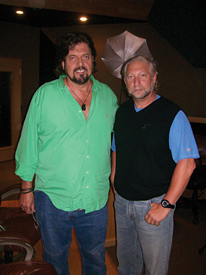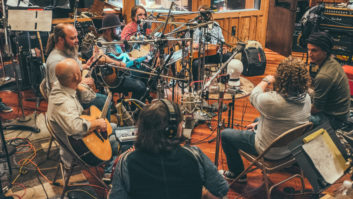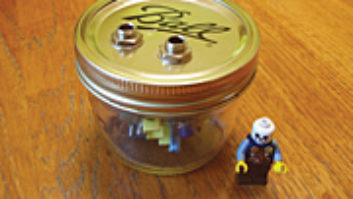
Artist/producer Alan Parsons (left) with new Sound Kitchen owner Ira Blonder
Photo: Peter Cooper
The economy is out of whack, the future of recorded music is indistinct, recording budgets are shrinking — and so Ira Blonder decided this is as good a time as any to purchase the Southeast’s biggest recording facility.
“What a time in the industry — when everything is in flux — to grab hold of one of the top facilities in the country and maybe put my own stamp on it,” says Blonder, who recently purchased The Sound Kitchen after the studio’s Texas-based owner, Weston Entertainment, resolved what was described as “internal litigation.”
Blonder is now the owner of a 19,000-square-foot facility that is situated in Cool Springs, a community that’s a 10-minute highway drive from the Music Row business center. His purchase might at first seem to be akin to buying a gas-guzzling SUV as soon as pump prices hit $4 per gallon. And Blonder — a real estate man who has brokered the sales of Ocean Way, the Quonset Hut, Omni Studios and other businesses — is quick to assert he sees little room in the market for big studios that follow a traditional business plan.
“If you’re big and single-focused, I don’t believe you can exist,” he says. “We have to evolve.” Blonder’s planned evolution in some ways harkens to old Hollywood days, when movie studios had writers, actors, producers and directors all working on one large lot.
“I want to create a campus environment, and I want to start developing artists,” he says. “Studios are often like hotels, where when there are vacancies you’re not making any money. We’re talking about taking dark time and doing something productive, and we’re going to have long-term benefits that go beyond renting out space by the hour. Why not take staff that is here already, put them into something creative, pull in some writers and match them up with a fresh new artist, and try and create something?”
Blonder envisions something like a studio version of the record companies’ much-discussed “360 deals,” but he doesn’t intend for the writing, publishing and artist-development activities to compromise the Kitchen’s main objective, which is to record music. The Kitchen has been home to recordings by Bruce Springsteen, Keith Urban, Rascal Flatts, the Dixie Chicks and plenty of others, and the summer brought country-soul growler Wynonna, teenaged country starlet Taylor Swift, heavy-metal band Trivium and Disney sensation Miley Cyrus. Such activity was both welcome and necessary for a facility that was battling an industry perception that it was either closed or closing.
“There’s definitely more opportunity here now than before,” says Chad Hannah, who works to book the Kitchen and to set up the new internal structure. (“We’re working on figuring out my title,” he says with a laugh.) Hannah weathered last January’s financial uncertainty when Blonder took over operational control after the Weston Group’s situation imploded. And Hannah stayed through the departure of popular studio manager Sharon Corbitt-House. “This place is going to still be known as a studio, but also as a hub of the music community.”
The Kitchen’s signature room is The Big Boy, which features 3,000 feet of tracking space and an 80-input API Legacy Plus board with Flying Faders. It is large enough to record an orchestra, and Blonder sees it as a natural fit for a film industry that is taking interest in Nashville. The Big Boy is a calling card for The Sound Kitchen and it’s a spot where artists can make music and film music: Swift, Cyrus, Rascal Flatts and others have made videos there, and the Cyrus video (for Wal-Mart’s online Soundcheck Series) proved that Big Boy is not only large enough for an orchestra, but it’s also large enough to fit an audience of 150 question-asking, autograph-seeking teen and sub-teen girls. Now that’s a multi-use facility.
Aside from Big Boy, the Kitchen has five other substantial tracking or mixing rooms, and a couple of digital studio spaces. Blonder and Tim Coyle have been surveying the building’s equipment, from consoles to rolling chairs, photographing and cataloging everything and making decisions about upgrades.
“I think we’re ready to make some moves,” Blonder says. “We’re going to move out equipment that doesn’t fit the vision.”
The vision of the recording artists and producers comes into play in studio choices at the Kitchen. Rock acts often prefer to mix in Studio C, which has a punchy SSL 4000G with Ultimation. J.R. McNeely has mixed major Christian rock albums for Relient K and UnderOath in C. Hannah’s favorite room is the self-contained Studio E, with its basement vibe and an SSL that matches C’s. At least the boards match for now: Blonder is open to input and eager for change, and he won’t let emotional attachments to gear get in the way of a positive move. Sound boards, studio walls and old-school business plans are about as secure under Blonder as Yankees managers under George Steinbrenner.
“This isn’t just a studio, it’s a canvas,” he says. “I can’t sing and I don’t play an instrument, but that doesn’t mean I can’t come from outside an industry and help it to change. And I want to meet people who want to go in on this, who want to own a piece of the Kitchen and have input on operations and equipment and the future. I’m a blank slate, just like this place is.”
Send Nashville news to
[email protected].


